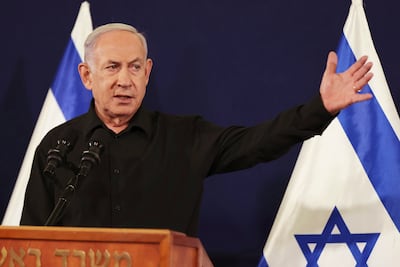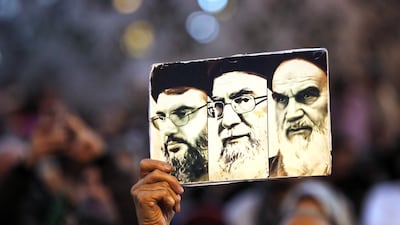A “grand bargain” often results from a major event that altered the status quo.
Hamas’s October 7 attack on Israel altered the status quo, in part because it exposed structural weaknesses in Israel’s military and intelligence establishment. Then, Israel’s retaliatory actions against Palestinians living in Gaza, in violation of international law, eroded some of the global goodwill towards the country and triggered protests and condemnations against its government.
If, indeed, there is a grand bargain to be had, neither Hamas nor Israeli Prime Minister Benjamin Netanyahu is likely to be a part of it. For both have effectively removed themselves from the broader equation, even though both are involved in “the event” that could precipitate the grand bargain.
Both have previously served each other’s interests since the rise of Hamas as a challenger to the Fatah movement and the Palestinian Authority. Today, both Mr Netanyahu and Hamas are weaker, and both are obstacles to achieving a lasting peace.
Of course, during this transitional phase, they are both necessary to complete a prisoner and hostage exchange deal. Therefore, they will be able to buy time until further notice.
A necessary distinction worth pointing out is that, while the Israeli public will decide Mr Netanyahu’s fate, the Palestinian people will not be the ones deciding Hamas’s future. That will probably be in the hands of the Iranian regime, which has made some gains following the October 7 attack.
Hamas and Hezbollah, which also relies on Tehran’s support, and are now figuring out how to sustain their old positions in the new Iranian context. In other words, both realise that the Iranian regime could be a party to behind-the-scenes talks, primarily with the US and with the regional powers, with a view to establish a new security system in which it has a voice.







Iran does not want to dispense with either group despite a backlash against them in recent weeks. Hezbollah and Hamas appear to be contemplating how to renew their own futures, in order to keep themselves viable in a possibly emerging regional-strategic situation, within the context of the grand bargain.
Hezbollah secretary general Hassan Nasrallah has navigated between war and warnings, making it seem as if he holds the initiative. In exchanging fire with Israel, the group has violated the sovereignty of the Lebanese state, undermined the security of its citizens, and put itself at the mercy of Nasrallah’s agenda.
Worse still, Hezbollah opened the Lebanese-Israeli border to Hamas, Islamic Jihad and other Palestinian armed factions in the name of unifying the Axis of Resistance, violating – again – Lebanon’s sovereignty but also the will of the people, who refuse to be dragged into the “resistance” war.
If Nasrallah is seeking to revitalise his group in light of Iran’s move towards a new regional security system that safeguards its interests, perhaps now is the time to present the group as a Lebanese political entity first and foremost. The context for regional peace has no space for an armed entity that serves Tehran’s interests.
In other words, it is time for Hezbollah to reconsider its position.
This is the time for Hezbollah’s leadership to listen to the Lebanese people, who reject the idea of hosting Hamas leaders in the country, especially as the Palestinian refugee camps have turned into armed camps.
Israel is negotiating with Egypt, Qatar, Turkey and other countries regarding hosting Hamas leaders, whose continued presence in Gaza is now rejected by Israel. It’s worth pointing out that these are sovereign states that decide the presence of Hamas leaders inside their territories. As for Lebanon, it lacks state sovereignty, and Hezbollah seems to be the one determining the boundaries of sovereignty and the presence of Palestinian leaders and armed factions in the country.
Hamas, meanwhile, has chosen the path to save itself through concessions over the path of self-destruction. Before Nasrallah’s speech on Friday, Hamas appeared to move towards some sort of compromise.
It informed intermediaries that it is ready to agree to Israel releasing half of the prisoners in exchange for the hostages it is holding. In return, it requested a ceasefire, and for Israel to halt its military operation against the movement, which has been successful despite its high human cost.

The timing of Hamas’s efforts to save itself by showing flexibility sends a signal to Hezbollah to tone down its own rhetoric. It appears Nasrallah did just that in his speech over the weekend.
And as Iran tries to secure its place at the table for restructuring the Middle East, both in terms of security and politics, it seems to acknowledge that there is no place for Hezbollah or Hamas in major negotiations for permanent solutions.
During his trip to the region, US Secretary of State Antony Blinken focused on putting in place transitional arrangements, particularly relating to the release of hostages, and sought to restrain Israel from destroying the civilian infrastructure in Gaza.
But he also aimed to envision the post-Israel-Gaza war scenario. Who will govern the enclave in the absence of Hamas? Is it possible to place it under temporary international-Arab administration until a clear roadmap for a lasting peace emerges?
Hamas has been as much of an obstacle to the two-state solution as Israel has been. But if the Biden administration succeeds in pushing post-Netanyahu and post-October 7 Israel to finally accept the case for it, the latter might be able to pave the way for a historic breakthrough in the Middle East and achieve a lasting peace with most Arab countries.
Moreover, Iran might surprise everyone by participating in the grand bargain that secures its interests in exchange for renouncing its commitment to destroying Israel.
All of this might seem premature right now, and developments – whether intentional or unintentional – could shatter any notion of a lasting peace. However, practical indicators and political pressures suggest that Arab countries involved in normalising relations with Israel are willing to assist the Biden administration in finding the necessary formula for such a peace.
Iran might not be too far from the dynamics of a grand bargain. It all depends on America’s determination to convince Israel that the time has indeed come to choose a lasting peace. Not doing so could make the threat of more attacks of the kind the world saw on October 7 even greater.


